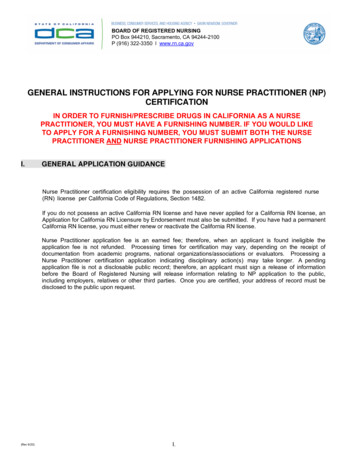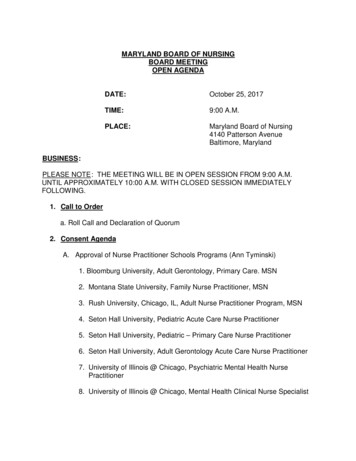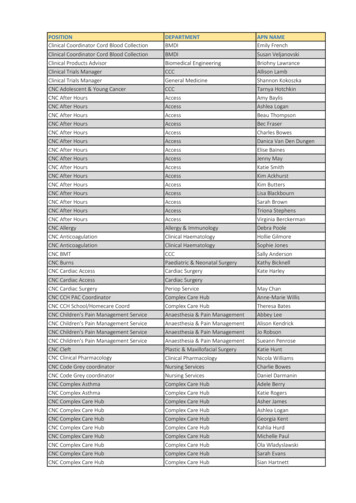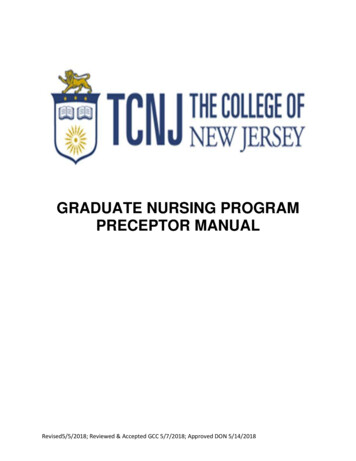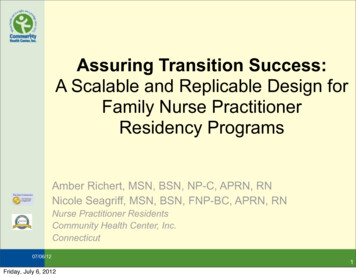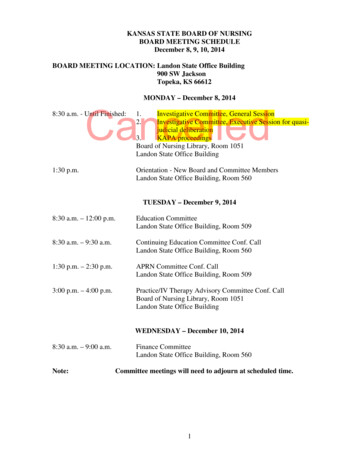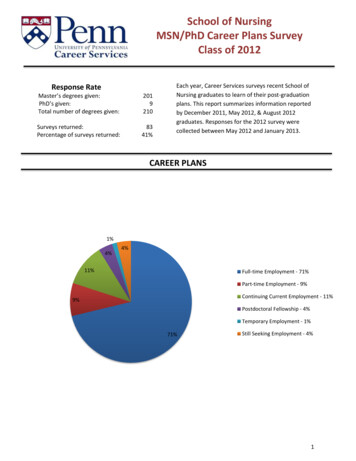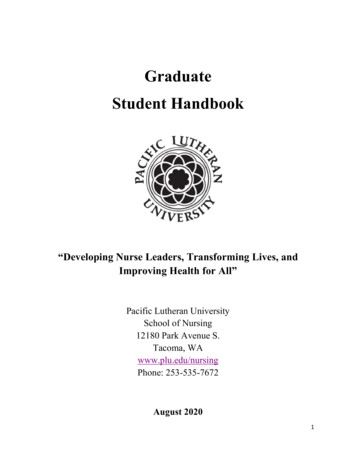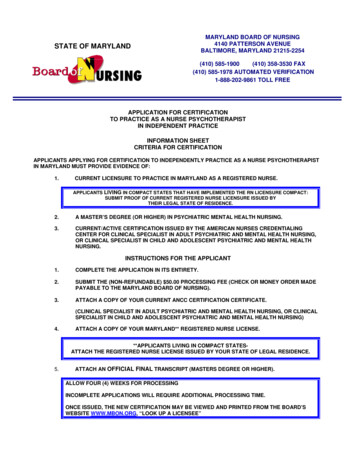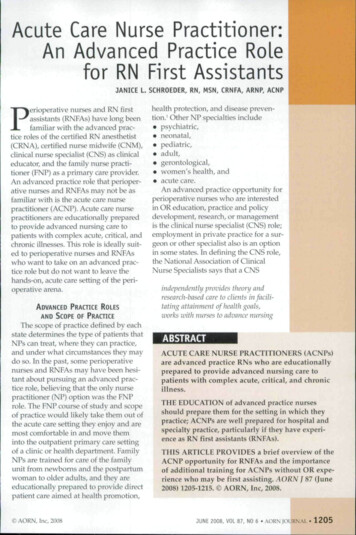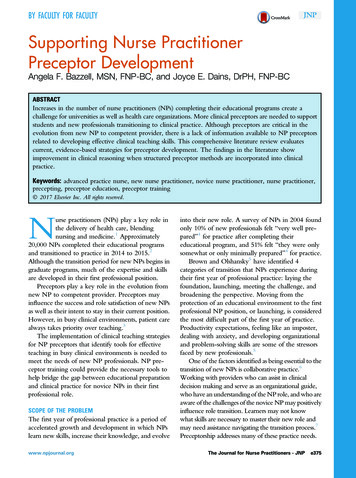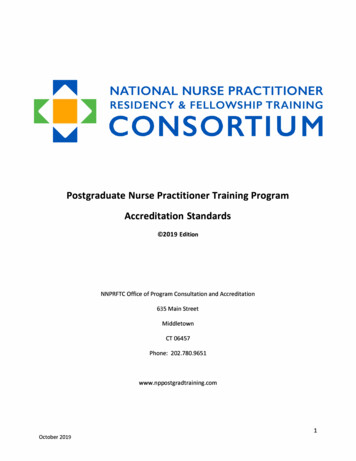
Transcription
lr NATIONAL NURSE PRACTITIONERRESIDENCY & FELLOWSHIP TRAININGCONSORTIUMPostgraduate Nurse Practitioner Training ProgramAccreditation Standards 2019 EditionNNPRFTC Office of Program Consultation and Accreditation635 Main StreetMiddletownCT06457Phon e: 202.780.9651www.nppostgradtraining.comOctober 2019
I PREFACEThe Nurse Practitioner {NP) profession, established more than 50 years ago, is based on a model of graduatelevel {MSN or DNP) education and training provided by an accredited NP Program in an academic institution.The challenge faced by new NPs as they transition from their excellent academic education and training totoday's health care environment, characterized by complexity at both the patient level and the system level,is that this entry-level preparation may be insufficient in at least two ways. First, the preparation may beinsufficient for the new NP to transition with confidence and competence into highly independent rolescaring for complex patients. Second, the preparation may be insufficient for the new NP to develop themastery of practice that lays the groundwork for sustained professional satisfaction and growth as an expertclinician and evolving leader in healthcare.The past decade has seen the development of innovative programs designed to respond to this challenge inthe form of postgraduate training opportunities for NPs. These programs, known both as residency andfellowship based on the preference of the program leaders and creators, originated in the safety net settingwith the early programs for primary care NPs based in federally qualified health centers. Since that time,postgraduate training programs for new NPs in primary care have been launched in multiple settingsincluding FQHCs, Nurse Managed Health Centers, private hospital/health systems, the Veterans Affairs {VA),and academic medical centers. In addition, postgraduate specialty training programs, almost exclusivelyreferred to as fellowships, have developed and are growing rapidly. The national development of suchprograms has been characterized by a high level of collaboration and communication among many NPleaders across the country, representing many different sectors, and supported by the recommendation ofthe Institute of Medicine Future of Nursing Report. In addition, the development of standards and of anaccreditation program has emerged as a priority goal. The National Nurse Practitioner Residency andFellowship Training Consortium {NNPRFTC) grew out of an informal network of new and maturingpostgraduate NP training programs. It was officially incorporated in 2015. The purpose of the NNPRFTCorganization is to improve the availability, efficacy and quality of healthcare by developing and refining aneducation and training model for postgraduate residency and training programs for nurse practitioners andto establish, implement, and monitor standards for postgraduate training programs for nurse practitioners.The NNPRFTC functions as an accrediting agency with the principal purpose of accrediting postgraduatetraining programs for nurse practitioners. Thus, this accreditation process was designed by experts in thefield of postgraduate NP training to provide postgraduate NP training programs with standards by which todevelop and assess their program structure and content as well as a method for programs and externalstakeholders to validate the quality and rigor of the postgraduate training program.I INTRODUCTIONThe National Nurse Practitioner Residency and Fellowship Training Consortium {NNPRFTC) is responsible forthe development, definition, and maintenance of standards for postgraduate NP training programs.Accreditation is a voluntary process that is engaged in by organizations that sponsor a formal postgraduatetraining program for NPs. The process of accreditation provides organizations and programs with a numberof benefits through formal recognition. Accreditation provides programs with the opportunity todemonstrate their compliance with standards and validate the quality of the program to externalstakeholders and prospective postgraduate trainees.The NNPRFTC uses the developed standards, which have been determined by a group of experts in the fieldof postgraduate NP training, to determine a program's initial and continued accreditation status and definethe responsibilities of a program to maintain its adherence to the standards. The standards provideprograms with guidance on the requirements, structure, and content of the program, but still allow forOctober 20192
October 2019
George Case c-FNP: Director Nurse Practitioner Residency Program, Penobscot Community Health Center,Bangor MEPatricia Dennehy DNP, c-FNP, FAAN: Principal, Health Management Associates, San Francisco CAMary Dougherty PhD, MBA: Director, Office of Academic Affiliations, Veterans Health Administration,Washington DCJohnnie Guttery MSN, RN: Clinical Director, Office of Academic Affiliations, Veterans HealthAdministration, Washington, DCCarole Hair PhD, GNP-BC, APRN: Coach/Mentor Academic Nursing Partnerships, Office of AcademicAffiliations, Veterans Health Administration, San Diego CADoQuyen Huynh DNP,FNP: ARNP Residency Director, ICHS, Seattle WAKathryn Wirtz Rugen PhD, FNP-BC, FAANP: Nurse Practitioner Consultant, VA Centers of Excellence inPrimary Care Education, Office of Academic Affiliations, Washington, DCAssociate Professor, University of Illinois at Chicago, College of NursingJulie Stuckey DNP-c ,APRN, AANP-C: Director of Health Services Our Lady of the Lake University, SanAntonio TXMargaret Flinter PhD. APRN. c-FN.P FAAN. FAANP: Senior Vice President and Clinical Director of CHC, Inc.Middletown, CTCONTRIBUTORS:Kerry Bamrick. MBA: Senior Program Manager, Weitzman Center, Middletown CTCharise Corsino. MA: Program Manager, NP Residency Programs, CHC, Inc, Middletown CTMark Splaine. MD, MS: Director of Education, Weitzman Institute, Middletown CTMandy Lamb. MA: Executive Assistant: CHC, Inc. Middletown CTOctober 2019
Standard 1-Mission, Goals and ObjectivesThe mission of the postgraduate NP training program must be clear, concise, and communicateto program staff, postgraduate trainees, and stakeholders the essential components of amission: the core purpose of the program, the reason for investment of resources and energy increating the program, and the focus of the program which will remain over time, even whileindividual components and activities of the program may change. The mission statement shouldbe reflected in the core documents of the program that guide decision making internally, andprominently featured in external communication vehicles for the benefit of potential applicants,stakeholders, and interested parties.The mission statement gives rise to the goals of the program, which should be clearly identified.The goals of the postgraduate NP training program will provide the direction and end points towhich the program strives to achieve and may be more broad than specific.The goals give rise to the objectives of the program which specify what the efforts, actions,content, and work of the program are intended to accomplish, and within specific time frames.While the mission statement usually remains constant over time, it is likely and advisable thatthe objectives and goals will change over time as a program matures, expands, or broadens itsscope. The mission, goals and objectives serve as cornerstone of a program's operation andprovide the context for program evaluation.October 20195
Standard 2 - CURRICULUMI INTRODUCTIONProgram curriculum is designed to build upon the comprehensive knowledge and skills gainedthrough the preceding high-quality NP education and academic preparation. The programcurriculum expands on the existing knowledge and skills of the new NP through intensive andprogressive clinical practice as the postgraduate trainee builds and cares for a panel of patientsthroughout the postgraduate NP Training Program. It promotes the practice of patient centered and team-based care and supports the use of evidence-based practices, informationtechnology and data. The implementation of Program curriculum requires organizations toappropriately adapt curriculum to remain current with changes in clinical practice and in theevolution of high performance practices. Within the postgraduate NP Training Program, thecurriculum functions as a link from education to practice and facilitates its application withpatients, often in settings where both the patients and the system are highly complex. Thecurriculum should promote postgraduate trainees as active learners who grow in experience byapplying acquired knowledge and skills in the clinical setting and reflecting on the process. Thecurriculum builds upon a model of continuous learning through educational didactic sessions,precepted and mentored clinics, specialty rotations, procedural practice, special events withinthe organization, training in applied QI strategies, leadership and professional development,and also provides increased experience and exposure to volume, variety, and complexity with afocus on progressive mastery, confidence, and competence.As postgraduate trainees progress through the Program curriculum, it is expected that they willdevelop products of their learning (i.e., case presentations, grand rounds presentations,practice improvement projects, etc.). Postgraduate trainees should be encouraged to developthese products through feedback and peer review so that the products can be shared broadlywithin and outside of the Program.I Program Curriculum and StructureThe Program curriculum must include the following core elements:1. Clinical-based practice and patient care experience (examples - precepted sessions, mentoredclinics, specialty clinical rotations)a. Clinical experiences must be sufficient in depth, breadth, variety, and volume includingmedical conditions/diagnoses and patient demographics, to prepare the postgraduatetrainee for clinical practice in the specialty of the Programb. Program must provide structured experience in progressive responsibilities for patientmanagementc. For each clinical experience and/or rotation the Program will provide learning objectivesto guide the postgraduate trainee achievement of competenciesd. The Program shall establish objectives for the numbers of patients by relevant factors(age, gender, major health challenges) and procedures deemed necessary to achieve theoverall goals of the postgraduate NP Training Program based on the practice setting2. Regularly scheduled didactic sessionsOctober 20196
3.4.5.6.a. For each didactic session the Program will provide learning objectives to guide thepostgraduate trainee in the mastery of didactic knowledge and its subsequentapplication to practiceSystem-based learning and quality improvement tools that underlie effective front-lineimprovement in carePopulation-based health focus - (assessment of community, environmental, and socioeconomicinfluences on health of patients and data-driven assessment of the population of focus)Leadership and professional development. particularly in inter-professional practiceCertificate of Completion awarded to trainee upon achieving the competencies andcompleting all program requirements.I Postgraduate NP Training Program Competency DomainsThe Program must integrate the following NP competency domains.At completion of the NP Training Program, to the trainee must be able to:1. Provide patient-centered care that is compassionate, valued, appropriate and effective for thetreatment of both common and uncommon health conditions and the promotion of health2. Demonstrate knowledge of established and evolving bio-psycho-social, clinical, epidemiological andnursing sciences, for the provision of evidence-based patient care3. Demonstrate the ability to evaluate one's own practice and improve outcomes of patient care basedon best available evidence, constant self-evaluation and life-long learning4. Demonstrate effective communication and collaboration with patients, their families, and inter professional colleagues5. Demonstrate a commitment to carrying out professional roles and responsibilities and adherence toethical principles6. Demonstrate an awareness of and responsiveness to the larger context and system of health care,as well as the ability to call effectively on other resources in the system to provide optimal healthcare7. Demonstrate the ability to practice within an inter-professional team in a manner that optimizessafe, effective patient- and population-centered care8. Demonstrate qualities required to sustain lifelong growth as healthcare professional and leaderI Sub-competency by DomainEach domain is built to elaborate on the achievement a number of sub-competency domains by the NPpostgraduate trainee.1. Patient Care - Provide patient-centered care that is compassionate, valued, appropriateand effective for the treatment of health problems and the promotion of health.Postgraduate trainees must demonstrate competence to independently:1.1 Perform all screening, diagnostic assessments, and procedures that are essential for area ofpractice and patient population1.2 Gather essential and accurate information about patients and their conditions throughreview of records, history-taking, physical examination, and assessment, and review of dataderived from laboratory and imaging testing.1.3 Organize and prioritize responsibilities to provide care that is safe, effective and efficient1.4 Interpret laboratory data, imaging studies, other tests required for the area of practice1.5 Make informed decisions about diagnostic and therapeutic interventions based on patientinformation and preferences, evidence-based information and clinical judgment1.6 Develop and carry out patient management plansOctober 20197
1.7 Counsel and educate patients and their families to empower them to participate in theircare and enable shared decision-making1.8 Provide appropriate referral of patients including ensuring continuity of care throughouttransitions between providers or settings, and following up on patient progress and outcomes1.9 Provide health care services to patients, families, and communities aimed at preventinghealth problems or maintaining health1.10 Provide appropriate role modeling for the inter-professional team2. Knowledge for Practice - Demonstrate knowledge of established and evolving bio-psycho social, clinical, epidemiological and nursing sciences, for the provision of evidence-basedpatient carePostgraduate trainees must:2.1 Demonstrate an investigatory and analytic approach to clinical situations2.2 Apply established and emerging bio-psycho-social scientific principles fundamental to healthcare for patients and populations2.3 Apply established and emerging principles of clinical sciences to diagnostic and therapeuticdecision-making, clinical problem-solving and evidence-based health care2.4 Apply principles of epidemiological sciences to the identification of health problems, riskfactors, treatment strategies, resources, and disease prevention/health promotion efforts forpatients and populations2.5 Apply principles of social-behavioral sciences to provision of patient-center care, includingassessment of the impact of psychosocial and cultural influences on health, disease, careseeking, patient engagement, and barriers to and attitudes toward care2.6 Contribute to the creation, dissemination, application, and translation of new health careknowledge and practices3. Practice-Based Learning and Improvement - Demonstrate the ability to evaluate one's ownpractice and improve outcomes of patient care based on best available evidence, constantself-evaluation and life-long learningPostgraduate trainees must develop skills and habits to be able to meet the followinggoals:3.1 Identify strengths, deficiencies, and limits in one's knowledge and expertise3.2 Set learning and improvement goals3.3 Identify and perform learning activities that address one's gaps in knowledge, skills, and/orattitudes3.4 Systematically analyze practice using quality improvement methods, measures, andprocesses, and implement and assess impact of changes with the goal of practice improvement3.5 Incorporate feedback into daily practice3.6 Locate, appraise, and assimilate evidence from scientific studies related to patients' healthproblems3.7 Use information technology to optimize learning3.8 Participate in the education of patients, families, students, trainees, peers, and other healthprofessionals3.9 Obtain and utilize information about individual patients, populations of patients {panelmanagement), or communities from which patients are drawn to improve care3.10 Continually identify, analyze, and implement new knowledge, guidelines, standards,technologies, products, or services that have been demonstrated to improve outcomesOctober 20198
4. Interpersonal and Communication Skills - Demonstrate effective communication andcollaboration with patients, their families, and inter-professional colleaguesPostgraduate trainees must demonstrate competence to:4.1 Communicate effectively with patients, families, and the public, as appropriate, across abroad range of socioeconomic and cultural backgrounds4.2 Communicate effectively with colleagues within one's profession or specialty, other healthprofessionals, and health related agencies4.3 Work effectively with others as a member or leader of a health care team or otherprofessional group4.4 Act in a consultative role to other health professionals4.5 Maintain comprehensive, timely, and legible medical records4.6 Demonstrate sensitivity, honesty, and compassion in difficult conversations, including thoseabout death, end of life, adverse events, bad news, disclosure of errors, and other sensitivetopics4.7 Demonstrate insight and understanding about emotions and human responses to emotionsthat allow one to develop and manage interpersonal interactions5. Professionalism - Demonstrate a commitment to carrying out professional roles andresponsibilities and adherence to ethical principlesPostgraduate trainees must demonstrate:5.1 Compassion, integrity, and respect for others5.2 Responsiveness to patient needs that supersedes self-interest5.3 Respect for patient dignity, privacy, confidentiality, and autonomy5.4 Accountability to patients, society, and the profession5.5 Sensitivity and responsiveness to a diverse patient population, including but not limited todiversity in gender, age, culture, race, religion, disabilities, and sexual orientation.5.6 A moral commitment to the ethical principles pertaining to provision or with holding of care,confidentiality, informed consent, and business practices, including compliance with relevantlaws, policies, and regulations6. Systems-Based Practice - Demonstrate an awareness of and responsiveness to the largercontext and system of health care, as well as the ability to call effectively on other resourcesin the system to provide optimal health carePostgraduate trainees must demonstrate that they are able to:6.1 Work effectively in various health care delivery settings and systems relevant to one'sclinical specialty6.2 Coordinate patient care within the health care system relevant to one's clinical specialty6.3 Incorporate considerations of cost awareness and risk-benefit analysis in patient and/orpopulation-based care6.4 Advocate for quality patient care and optimal patient care systems6.5 Participate in identifying system errors and implementing potential systems solutions6.6 Perform administrative and practice management responsibilities commensurate with one'srole, abilities, and qualificationsOctober 20199
7. Inter-professional Collaboration - Demonstrate the ability to practice within an inter professional team in a manner that optimizes safe, effective patient- and population centered carePostgraduate trainees must demonstrate that they are able to:7.1 Work with other health professionals to establish and maintain a climate of mutual respect,dignity, diversity, ethical integrity, and trust7.2 Use the knowledge of one's own role and the roles of other health professionals toappropriately assess and address the health care needs of the patients and populations served7.3 Communicate with other health professionals in a responsive and responsible manner thatsupports the maintenance of health and the treatment of disease in individual patients andpopulations7.4 Understand the types of different roles and their associated responsibilities that are neededto establish, develop, and continuously enhance Inter-professional teams to provide patient and population-centered care that is safe, timely, efficient, effective, and equitable8. Personal and Professional Development - Demonstrate qualities required to sustainlifelong growth as healthcare professional and leaderPostgraduate trainees must demonstrate that they are able to:8.1 Use self-awareness of knowledge, skills, and emotional limitation to engage in appropriatehelp-seeking behaviors8.2 Demonstrate healthy coping mechanisms to respond to stress8.3 Manage conflict between personal and professional responsibilities8.4 Practice flexibility and maturity in adjusting to change with the capacity to alter one'sbehavior8.5 Demonstrate trustworthiness that makes colleagues feel secure when one is responsible forthe care of patients8.6 Provide leadership skills that enhance team functioning; the learning environment, and/orthe health care delivery system8.7 Demonstrate self-confidence that puts patients, families, and members of the healthcareteam at ease8.8 Recognize that ambiguity is part of clinical health care and respond by utilizing appropriateresources in dealing with uncertainty8.9 Obtain feedback and/or peer review on an aspect of their learning and develop this into aproduct that can be shared in the residency community or submitted as a scholarly productOctober 201910
Standard 3- EVALUATIONI INTRODUCTIONProgram evaluation is a critical component to a high quality educational training Program. Programsmust demonstrate they have an established process of intensive, ongoing, and cumulative evaluation ofpostgraduate trainees, core Program components and Program self-assessment. A strong Programevaluation component will assure the quality, effectiveness, and continuous improvement and re-designof programmatic structure, practices, and content of the Program itself. Further, such systematicevaluation provides an opportunity to compare and contrast outcomes within and between sponsoringorganizations and to further advance the depth of knowledge and measurable outcomes for the fielditself.The evaluation process should be developed and conducted based on the specific areas of focus of theAccreditation Standards for Postgraduate NP training programs. A well-developed process is clearlydetailed in advance of starting the Program, and is communicated to all parties: preceptors, NPpostgraduate trainees, Program Staff, and any evaluation team members, if applicable. Evaluationbegins at the beginning of the postgraduate NP Training Program year, with self-assessment ofcompetency by the trainees, continues through the on-boarding and initial training. The Programshould strive to include both formative and summative evaluations. Evaluations may occur weekly,monthly, quarterly, semi-annually, and annually (upon program completion) using pre-determined toolsand processes. Evaluation is bi-directional, with evaluation of all core program components andprogrammatic evaluation by organizational leaders. The process is used to identify strengths,weaknesses, and opportunities for improvement and should lead to the development of plans forcontinuous improvement and corrective intervention with subsequent evaluation of the effects of theinterventions.I NP Postgraduate Trainee3.1- The Program must establish and use an objective, systematic and cumulative evaluation andassessment process that is designed based on the Program's core elements, competency, andcurriculum components.3.2 - The Program must assess the performance and development of each postgraduate trainee throughperiodic and objective assessment focused on core competency areas in both clinical and professionalareas. The assessment should include the identification of any deficiencies or performance concerns.3.3 - The Program must have a clear process for promptly identifying and addressing postgraduatetrainee performance concerns, as well as the development of an improvement plan with measurablegoals.3.4 - Program evaluations should include:i.Postgraduate trainee competency self-assessmentii.Postgraduate trainee evaluation of all core program components (preceptors for continuityclinics and specialty rotations, and weekly didactic sessions)Preceptor (both continuity clinic and specialty) assessment of the postgraduate traineeiii.performanceOctober 201911
iv.v.Reflective self-assessment by trainee of their experienceFinal programmatic evaluation3.5 - The Program is encouraged to assist the postgraduate trainee in assembling the assessmentelements. This assembly could take the form of a learning portfolio. Both the Program and thepostgraduate trainee could add elements to the portfolio over time. Such a portfolio could be used bythe postgraduate trainee as well as by Program Faculty and/or the Program Director in preparing forevaluation and coaching sessions. Learning goals established during evaluation and coaching sessionswould be entered into the portfolio and reviewed a subsequent evaluation and coaching sessions.I Organizational Evaluation3.6 -The Program must review and assess the operational and financial impact of the Program on theoverall organization and evaluate for any improvements or efficiencies in business operations.3.7 - The Program must have a documented process for the initial and ongoing evaluation of all sitesused for postgraduate trainees' clinical practice experiences. The evaluation of each site should include:a. The site itself (e.g., the resources provided, staffing)b. The experience for the postgraduate trainees at the site3.8 - The Program is encouraged, but not mandated, to have a Residency Advisory Committee (RAC).Such a committee would consist of faculty, external members, supervisors, at least one postgraduatetrainee representative, and should include the Program Director as an ex-officio member. The RACshould advise and assist the Program Director to:a. Develop and update a written residency mission statement that describes goals and objectives;b. Develop educational experiences and clinical rotations;c. Provide new or emerging knowledge, skills, or competencies that may influence the content orconduct of postgraduate trainee education;d. Review the sponsoring institution's internal review of the program;e. Review confidential and written postgraduate trainee evaluations of faculty and the program;f. Review the program director's evaluations of individual postgraduate trainees; and,g. Review the faculty evaluations of the program director and the program.I Clinical Faculty Evaluation3.9 - The Program must have an established process to evaluate clinical faculty which include preceptorsand didactic presenters. The evaluators may include but are not limited to postgraduate trainee and theProgram Director.3.10 - The Program must have a clear process for promptly identifying and addressing facultyperformance concerns, as well as the development of an improvement plan with measurable goals.I Ongoing Program Self-Assessment3.11 - The Program must have an established process of ongoing program self-assessment that shoulduse the Accreditation standards as a method to identify the program's compliance. Self-assessmentshould be done on a periodic basis, no less than annually, and document its results. The Program self-October 201912
assessment should include:a. Programmatic assessment and corresponding outcome measures:i. Postgraduate trainee completion ratesii. Postgraduate trainee withdrawals or dismissalsiii. Postgraduate trainee evaluations of core program elementsiv. Preceptor evaluations of postgraduate trainee performancev. Graduate employment datavi. Alumni satisfactionvii. Employer satisfaction (if possible)viii. Program staff turn-overb. Documentation of program's self-assessment results and corresponding action plan thatincludes:i. Identified strengths, weaknesses and opportunities for improvementii. Structural or content program adjustments to address areas of weakness and areas ofimprovementiii. Evidence of improvement through implementing the action plan developed fromevaluation resultsOctober 201913
Standard 4 - PROGRAM ELIGIBILITYI INTRODUCTIONPostgraduate NP training programs are formal postgraduate training programs that offer a structuredcurriculum with intensive clinically based practice experience in a high-performance practiceenvironment, as well as on-going didactic education for new Nurse Practitioners. Programs must be aminimum of twelve months, full time training opportunities within an appropriate health care deliveryorganization. Programs may determine that a longer period of time is required to achieve the desiredgoals and should state that clearly in their application.I ELIGIBILITY CRITERIAApplication for Accreditation for Postgraduate NP training programs should be completed by theprimary sponsoring organization. Postgraduate NP training programs must meet the following basiccriteria in order to be eligible for consideration of accreditation.4.1-The sponsoring organization must be located within the US and operate Postgraduate NP trainingprograms in settings that may include but are not limited to: Federally qualified health centers {FQHCs) and FQHC look-alike organizations Nurse managed health centers Other safety net settings such as the Indian Health Service Veterans Health Administration system Integrated Health Systems Private clinic systems an
r lNATIONAL NURSE PRACTITIONER RESIDENCY & FELLOWSHIP TRAINING CONSORTIUM October 2019 Postgraduate Nurse Practitioner Training Program Accreditation Standards 2019 Edition NNPRFTC Office of Program Consultation and Accreditation 635 Main Street Middletown CT06457 Phone: 202.780.9651 www.nppostgradtraining.com
